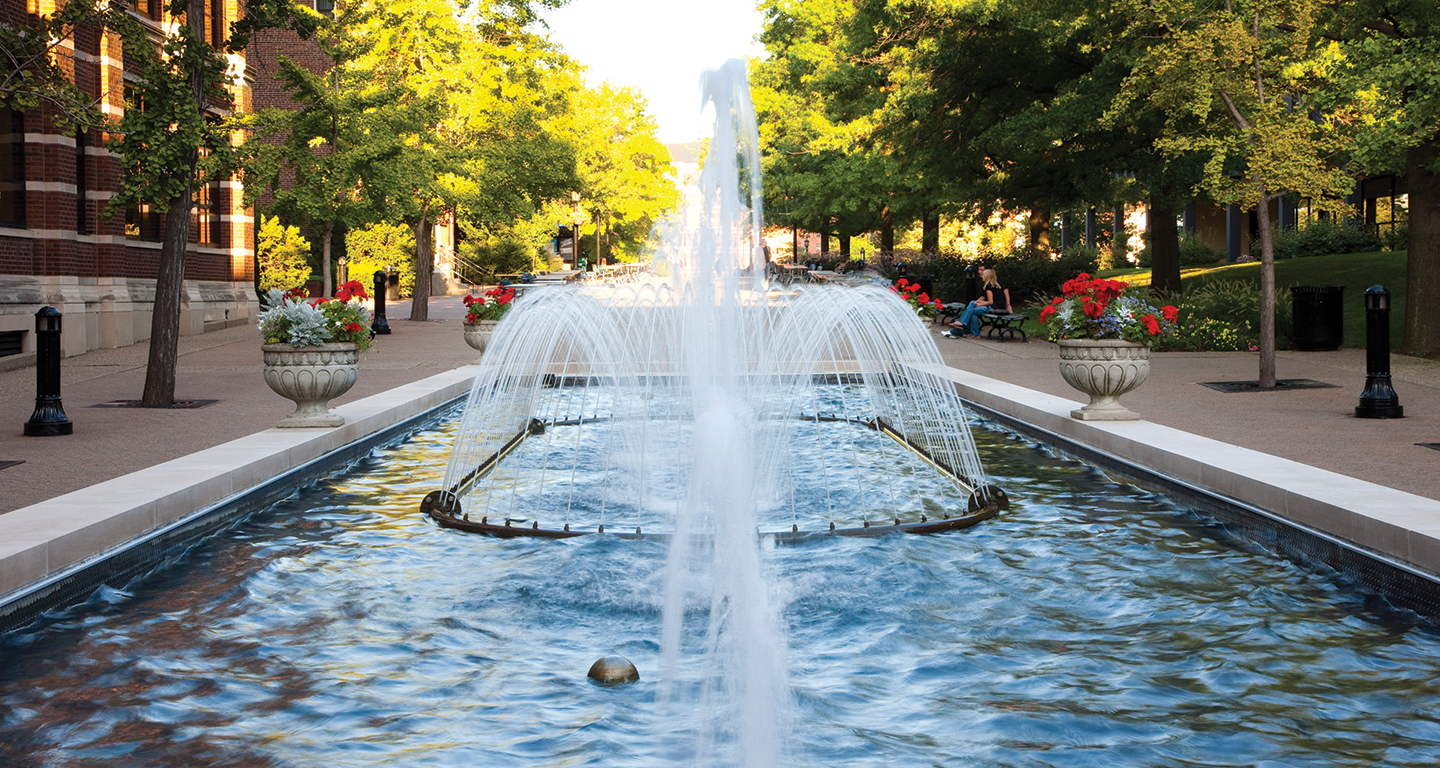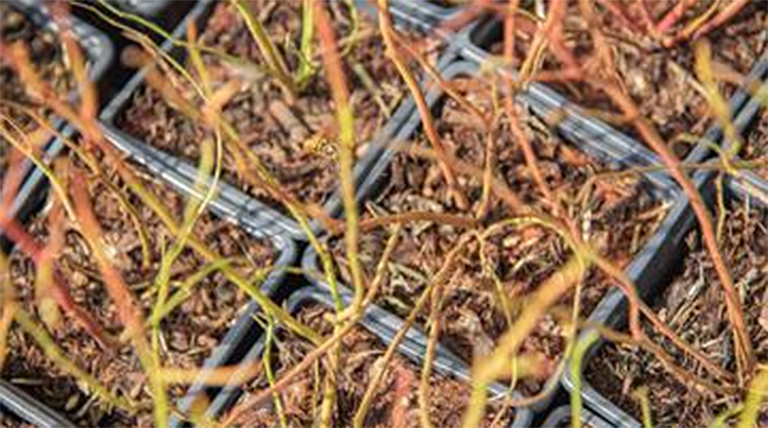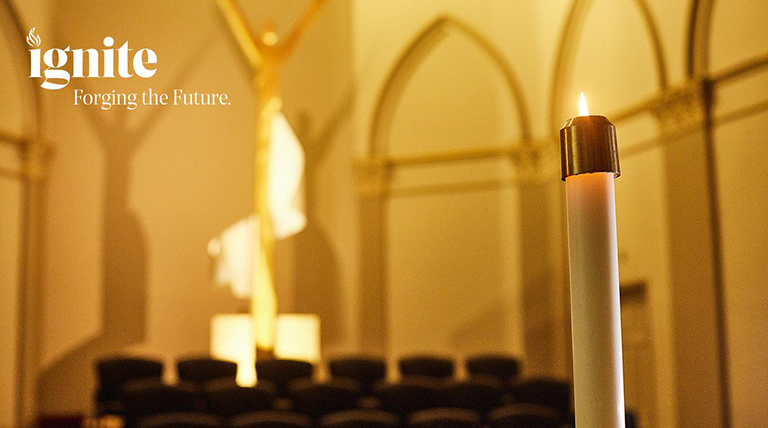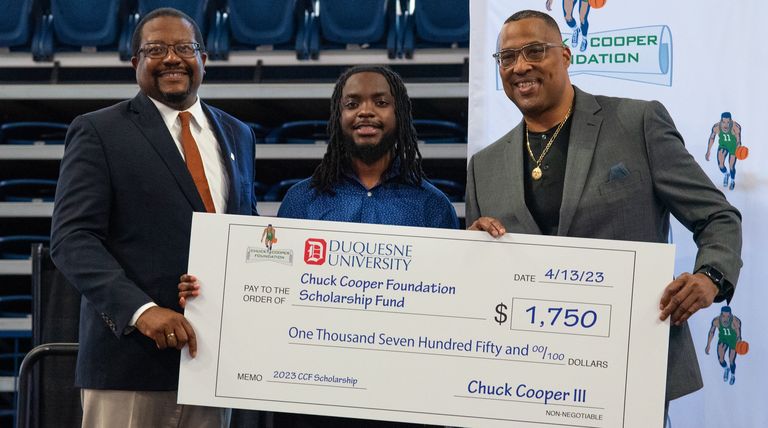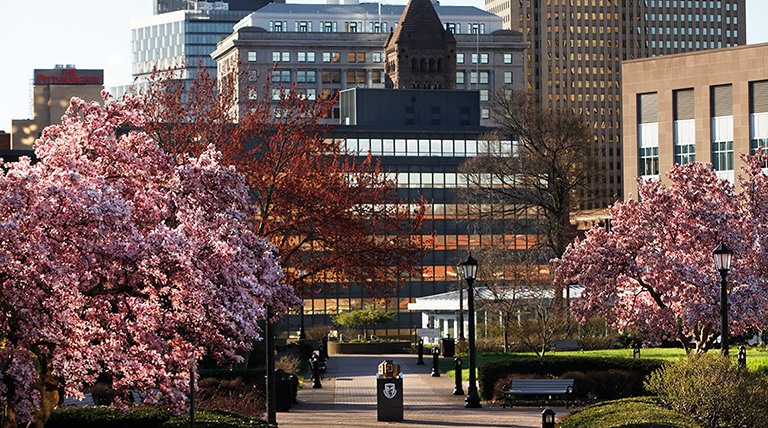An environment for opportunity.
Duquesne was founded to advocate and advance opportunity for immigrants. For nearly 150 years, we’ve stood up for the health and economic well-being of people and communities on the margins. These aren’t research subjects. They’re our neighbors. We’ve worked hard to become a trusted partner—listening and learning, investing the time and energy that authentic collaboration demands.
Duquesne’s initiatives are designed with the education of our students as the foremost priority, and the betterment of communities as an ultimate goal. As our mission makes clear, Duquesne serves God by serving students, who, in turn, turn, go on to serve others. To achieve our mission and succeed in our initiatives, our policies are designed to support all members of our community.
Our work in service, research and outreach creates a vibrant intellectual community
that pursues and achieves practical gains to improve our world.Initiatives for Our Students and Our Region
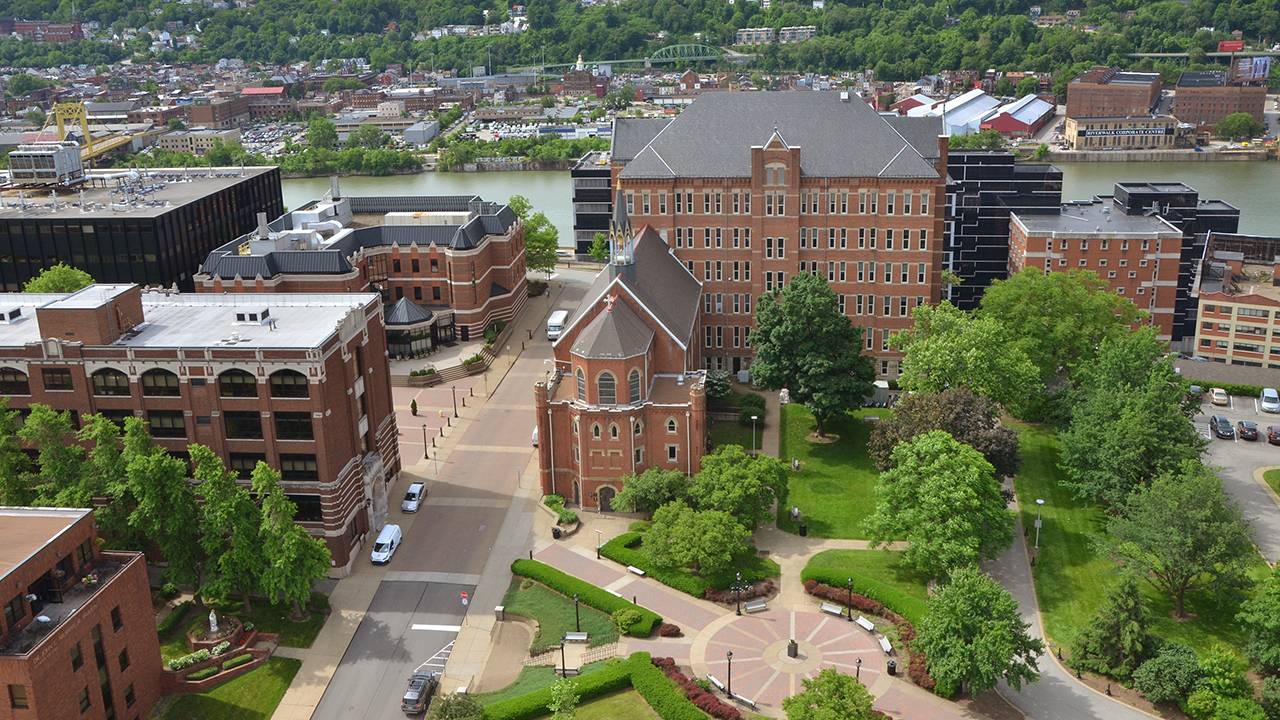
In 2017, one year into Ken Gormley's term as the 13th president of Duquesne University, a Strategic Plan was unveiled that stated its aim clearly: Re-Imagining Duquesne's Spiritan Legacy for a New Era (2018-2023). Now, in anticipation of the University's 150th anniversary in 2028, President Gormley has worked with his leadership team and the Board of Directors to refresh the Strategic Plan with an eye toward innovations and new successes in the future.
Vision 150: Continuing the Momentum
Re-Imagining Duquesne's Spiritan Legacy for a New Era
Duquesne University Strategic Plan
Updated August 2024
In 2017, one year into Ken Gormley’s term as the 13th president of Duquesne University,
a Strategic Plan was unveiled that stated its aim clearly: Re-Imagining Duquesne’s
Spiritan Legacy for a New Era (2018-2023). Now, in anticipation of the University’s
150th anniversary in 2028, President Gormley has worked with his leadership team and
the Board of Directors to refresh the Strategic Plan with an eye toward innovations
and new successes in the future.
The initial Plan, adopted in 2017, had its roots in the vision achieved by the selfless
priests who traveled to Pittsburgh to establish a small Catholic college to educate
the families of recent immigrants working in the steel mills. Over time, the priests
built a world-class institution of higher education that grew in both size and stature
to become Duquesne University, educating the doctors, judges, financiers, journalists
and other professionals who contributed to the rich tapestry of life in the Pittsburgh
area and beyond.
Since the launch of the Strategic Plan, the University has rallied around the animating
question President Gormley posed when it was released seven years ago: In what ways
can Duquesne's strategic priorities reflect the spirit (and the Spirit) that animated
founder Fr. Joseph Strub and his colleagues and re-imagine these for a new era?
The answer, developed through the work and persistence of a dedicated community of faculty, staff, alumni and students, is evident in numerous landmark initiatives built and grown since the adoption of the Strategic Plan. With an aim to educate physicians to meet demand in underserved rural and urban communities, Duquesne’s new medical school welcomed its first class in the fall semester of 2024. After launching new engineering programs in 2023, student interest skyrocketed in those programs, and the newly named School of Science and Engineering is expanding in bold new directions. Historic investment in what is now the Thomas R. Kline School of Law of Duquesne University elevated an already nationally prominent school to even greater heights, as a newly refurbished building was dedicated and the University recognized the largest philanthropic commitment in its history.
The Bridges Common Learning Experience re-invented the foundations of a Duquesne undergraduate
education, invigorating an admissions process that honors students who are discovering
what they’re good at—and why that’s good for the world. As Duquesne has expanded horizons
in its work and the geographic regions where it recruits students, the University
also has strengthened its Spiritan ideals of a diverse and welcoming community, leading
to the creation of an Office of Community Engagement, the hiring of Duquesne’s first
Chief Diversity Officer, and the creation of a new Center for Excellence in Diversity
and Student Inclusion in a highly visible location in the Union. Determination to
re-build the strength of its athletic program resulted in a redesigned UPMC Cooper
Fieldhouse and an exciting A-10 conference men’s basketball championship, the first
in half a century. And fueling so much of the gains was vigorous philanthropic investment
in scholarships, infrastructure, and intellectual and academic centers of inquiry.
The University’s reputation and impact in Pittsburgh has never been stronger and Duquesne’s
national profile has never been higher.
The Strategic Plan has yielded significant gains; yet, its essential imperatives are constantly being recalibrated and re-imagined. The imperatives in that plan focus on educational impact; community engagement; interdisciplinary strength; vibrancy among students, faculty and staff; and financial resilience and entrepreneurship. As we continue to evolve, our vision looks ahead to the 150th anniversary of the University while staying anchored in the founding intent of the Spiritan priests.
This re-imagined Strategic Plan: Vision 150 reflects that careful process of imagining ways to build on the impressive successes envisioned in previous versions. In pursuing these strategic imperatives in new ways, Duquesne will advance for an exciting new era of success and continue its pursuit of bigger goals.
Five Strategic Imperatives
Duquesne will identify bold pathways to offer students the knowledge and skills they will need for productive and fulfilling lives and careers in the 21st century.
Institutions of higher education often declare they are “student-centered.” Yet, the reality of making daily decisions that advance student interests is not so easy or clear-cut. Today’s Duquesne students have far different backgrounds than those children of immigrant steelworkers who first enrolled; still, they face similar hurdles in attaining success.
To prepare them for the world beyond graduation and to create a student-centered environment that will be a national model, we are committed to ensuring that Duquesne will:
- consider the best interests of our students as the polestar of all decision-making, elevating even further this aspect of Duquesne’s historic mission;
- review and assess demand for all academic programs and majors across the University, including high-demand potential programs (engineering, pre-law, pre-med, allied health programs, etc.), and develop plans for prioritizing resource investment;
- continue to build and solidify an engineering department within the newly named School of Science and Engineering that adds programs that are financially and academically feasible, to complement the existing biomedical engineering program and provide new pathways for students and for market distinction;
- provide individualized services that begin even before students apply for admission and continue long after they graduate, making the Duquesne experience a rich lifetime experience;
- focus on the development and wellbeing of the whole student—intellectual, physical, mental, emotional and spiritual—with a renewed emphasis on core values and ethics and a clear statement of goals for the student experience at Duquesne;
- provide a safe, comfortable, interactive living environment that fosters the growth of students academically, as persons, as citizens and as tomorrow’s leaders;
- build a comprehensive undergraduate research program that is interprofessional and interdisciplinary, encompassing scholarly, professional and creative enterprises;
- incorporate into the curriculum an emphasis on civil discourse and an exploration of the positive and negative impacts of new technology on learning and other aspects of contemporary life;
- continue to integrate practical applications and experiences into academic offerings so as to prepare students for the fluctuating demands of an evolving workforce, having comprehensively reevaluated all facets of our curriculum to build the Bridges Common Learning Experience;
- collaborate with the Spiritan Congregation and its leadership to incorporate programs into academic life at Duquesne that advance the University’s Spiritan mission;
- expand understanding and practice of student advising to better connect with University services and resources and that more strongly emphasizes wellbeing;
- become a University known for providing first-rate internships and meaningful job/career opportunities for its students;
- re-imagine career services as career development to address the ever-changing job market and students’ needs throughout their time at Duquesne and beyond;
- maintain and enhance international offerings for undergraduates, graduate students and law students;
- re-engage Duquesne’s highly-talented alumni to make valuable internship and job opportunities available to students locally and nationally;
- create a vibrant campus that fosters a renewed sense of institutional spirit for all students by supporting the University’s athletic programs;
- recruit and retain students best able to benefit from Duquesne’s programs, including students with limited resources; and
- become a University known for providing a great value in higher education—constituting an excellent investment for students and their families—and maintain a positive and growing regional and national reputation and position.
Duquesne will become the region's flagship institution for community engagement through mutually beneficial partnerships that advance the city, the region and the world.
Throughout its history, our University has contributed to the dramatic development of the city, the region, the nation, the Catholic Diocese that serves as its home and its partners around the globe. The challenges that confront communities today—locally, nationally and internationally—make Duquesne an invaluable partner.
In the role of a servant leader, Duquesne will:
- refashion and broaden its community engagement initiatives to develop authentic,
mutually beneficial alliances with governmental, faith-based and community organizations, focusing in particular on those in the Hill District, Uptown, the Mon Valley and other underserved areas, bolstered by the commitment of the proposed College of Osteopathic Medicine to address primary care shortages and create opportunities for future medical professionals from marginalized communities; - position the University to pursue another School- or College-level academic enterprises connected to its mission, values, and community engagement while offering needed interprofessional and interdisciplinary education;
- enhance the University’s community engagement initiatives to promote civic awareness among students, faculty and staff, and to support the work that results;
- empower Duquesne’s inaugural Chief Diversity Officer to develop relationships within the campus community and among external constituents with the goal of creating more opportunities for successful student and employee recruitment and engagement;
- play a central role in the development and sustainability of the Uptown Eco-Innovation District along the Forbes and Fifth Avenue corridors adjoining the Duquesne campus, and develop the University's presence in an appropriate role in the 28-acre Lower Hill development;
- collaborate with the Diocese of Pittsburgh and other dioceses to create educational support programs to assist in the development of their lay associates, clergy and students as these dioceses reconfigure themselves for the 21st century;
- develop creative programs for students in diocesan and public schools, including in underserved areas, through the Duquesne University Leadership Academy initiative and other programs;
- advance curricular offerings that enhance the Catholic and Spiritan identity of the University;
- expand global engagement by recruiting greater numbers of international students and by solidifying rich existing relationships in Africa, Latin America and other areas of the world where Spiritans are already present or their mission needed;
- expose students to languages, cultures and religions that differ from their own in order to encourage them to respond to the needs of others; and
- ensure that all students have an opportunity for an international and/or intercultural experience during their time at Duquesne.
Duquesne's academic programs will transcend traditional boundaries, positioning it as a leader in interdisciplinary and interprofessional programs.
Our University grew in 1911 when it established its first professional school in law.
Other new schools followed: business, pharmacy, nursing, education, music and the
health sciences. Yet, higher education today must resist the notion of rigid silos.
The most exciting and creative work on campus often occurs when scholars collaborate
across traditional academic boundaries. Moreover, employers increasingly seek to recruit
students who are comfortable and nimble
working on interdisciplinary teams.
Recognizing the importance of these trends, therefore, Duquesne will:
- foster interprofessional education in health-related fields, leveraging the expertise of pharmacy, nursing, health sciences, healthcare ethics, biomedical engineering, the basic sciences, forensics and other existing academic programs to advance Duquesne’s reputation In integrative health;
- maintain its strong reputation and position to explore and attract mission-aligned collaborative opportunities with other institutions of higher education and other entities as the higher education landscape evolves;
- explore and plan for enhanced learning spaces and buildings to house health sciences and integrative health in a contemporary hub on campus as those academic areas continue to expand;
- build faculty strength in interprofessional educational practices;
- expand existing health sciences programs and add new specialties to satisfy the national and international demand for such services;
- strengthen the presence and outreach of the University’s Center for Integrative Health as a community-focused learning environment that also is a regional asset that benefits people on the margins;
- launch its proposed College of Osteopathic Medicine, which will comprise interprofessional simulation labs—next generation technology— clinics and research labs that will allow faculty, students and healthcare professionals to work together in a dynamic educational environment;
- continue to explore developing interdisciplinary programs in other cutting-edge areas, including information technology, informatics, data analytics, sustainability and other areas in which demand and need have grown;
- explore creating a Center for Health and the Humanities to build on existing strengths at Duquesne and to connect the University’s long leadership in ethics and philosophy to the myriad of issues facing health care practitioners, leaders, researchers and consumers;
- continue to develop the Grefenstette Center for Ethics In Science, Technology and Law through naming a Director who will actively seek grants to advance the center and to enhance programs that explore the ethical implications of research and emerging technologies, to build upon historical strengths and address a critical need in this region;
- position the Center for Emerging and Integrative Media as an asset for the entire University;
- create other interdisciplinary programs across traditional academic boundaries linking various schools and disciplines, for example, by devising new ways of delivering instruction in foreign language skills to equip students for global opportunities; and
- continue to innovate and develop future-focused credentials, including certificates, micro-credentials, micro-master’s degrees and other products that meet the lifelong learning needs and expectations of a highly flexible and motivated professional population.
Duquesne will create a vibrant campus community that fosters the achievements of its talented faculty, students and staff.
When it was founded, Duquesne relied heavily on a small number of dedicated Spiritan priests to deliver “the Duquesne education.” Today, the complexity of a modern research university demands an increasingly diverse and talented workforce and resources.
To achieve this end, Duquesne will:
- recruit, hire and retain a talented, diverse, productive and dedicated community of teachers and staff to enrich and energize the entire campus;
- continue to support and strengthen a culture of individual attention and personal contact with respect to students, alumni, parents and community constituents, reflecting the distinctive student-facing character of the University;
- create one or more integrated student success locations, where students can access an array of academic and co-curricular support resources, to add to Duquesne's ability to attract and retain students and help them thrive and succeed;
- develop goals and resources for staff and faculty professional development in order to build the skills and knowledge necessary to deliver on the goals of this plan and to serve the evolving needs and expectations of students and other constituencies served by the University;
- develop more community traditions to enhance student involvement and loyalty and to support and convey a distinctive campus identity at Duquesne;
- cultivate an enthusiastic campus culture of diversity and inclusion in recruitment, hiring and programming across campus, supported by a robust Diversity and Inclusion Council;
- refocus support for teaching excellence and pedagogical originality by tapping into advances in learning science to create transformative opportunities for students;
- develop recommendations and guidelines for remote and flexible work arrangements in order to adapt and benefit from new workforce expectations in a manner consistent with Duquesne’s culture of individual attention and personalized education;
- redefine the Office of Research to creatively support research and scholarly initiatives that attract a wide array of current and future funding opportunities;
- re-examine how the University interacts with adjunct faculty and enhance
meaningful connection and inclusion mechanisms for those faculty members; - develop and infuse a holistic model for well-being across University operations as a factor in supporting a vibrant community;
- explore opportunities for a strong University presence along the Bus Rapid Transit system, particularly on its Fifth Avenue and Forbes Avenue corridors near campus;
- enhance resources, awareness and appreciation for employee well-being both for talent retention purposes and to model for students the expectations the University values;
- continue to strengthen the Staff Advisory Council, which provides input to the administration on matters of importance to all non-faculty employees; and
- pursue national certification and recognition of Duquesne as a desirable place to work.
Duquesne will encourage an entrepreneurial spirit that will allow it to creatively steward University assets, adapt to changing environments and enhance its financial vitality to fulfill its mission for a new era.
The Spiritans constructed Old Main on a limited budget by using bricks that they themselves had fashioned from the clay on which the building now stands. Today’s campus operates like a small city and requires the same commitment to efficiency and detail. To ensure the institution has the physical and financial means to maintain and grow in its mission of serving God by serving students, Duquesne will:
- grow by expanding innovative curricular offerings matched to future-focused demand and the breadth of education necessary to support such focus;
- explore ways to expand the impact and visibility of the proposed new College of Osteopathic Medicine;
- remain on the cutting edge of higher education, pursuing initiatives involving ethics, technology and other areas that allow Duquesne to establish a niche as a regional, national and international leader;
- become nationally known for outstanding enrollment management services, providing personalized attention to applicants, admitted students, current students and their families, and shaping campus development with the student experience foremost in our planning, from first visit to commencement;
- explore creation of a combined welcome center and student services hub on campus;
- build greater affinity with all alumni in ways that inspire and retain a higher number of annual donors, student referrals and volunteers, in order to build an alumni body that is fully engaged and that participates actively, including in supporting a highly successful comprehensive fundraising campaign;
- actively and creatively engage all University stakeholders, including alumni, in the pursuit of sustained endowment growth;
- creatively and effectively develop, manage, maintain, use and/or liquidate University assets to allow optimum focus on core strengths and fuel the institution’s ability to grow, with a particular emphasis on re-evaluating and managing University properties along the Fifth Avenue corridor, including exploring possibilities for a hotel and an "Alumni House" suitable for receptions and focused events with alumni, prominent University partners and/or visiting dignitaries;
- create a process for succession planning for administration, deans, faculty and staff leadership, Spiritan campus leaders and other key positions;
- maintain, enhance and beautify the physical plant, so that the University’s resources can be utilized in a productive and energizing fashion for present and future generations;
- phase out and remove from the physical plant those properties that do not and cannot be adapted to serve the University's evolving needs in order to utilize those resources in other ways;
- monitor emergent technologies for their educational and administrative potential and adapt accordingly;
- broaden public appreciation for Duquesne as a leading Catholic, Spiritan university by utilizing new strategies in marketing and communication;
- explore possibilities for regional learning alliances and educational partnerships beyond the campus, including collaborations with community colleges and other institutions, that can help satisfy essential workforce needs and assist students from an array of different backgrounds achieve success;
- engage in outcomes assessment in all areas of the University’s operation, using the results to achieve continuous improvement;
- place a high value on sustainability, encompassing environmental protection, social responsibility, innovation and sound business and policy practices, and communicate regularly and effectively the plans and successes the University achieves in this area; and
- annually assess and revise the current Strategic Plan to reflect the timeless values, energy and foresight of Duquesne’s Spiritan founders, evaluating its outcomes as a measure of success in its implementation.
Policies and Guidelines
University-wide directives
A University Policy is an official directive, approved by the President based on the recommendation of the Executive Officers (Vice Presidents), that has broad and direct application across all schools, departments, and other administrative units of the University. A University Policy has historically been known as a TAP, and the group, collectively, as the TAPs.
Undergraduate and graduate official catalogs
It is the responsibility of each student to know the requirements for their program of study and to meet all requirements satisfactorily for graduation. The catalogs are maintained by the University Registrar and are updated annually.
Student and faculty research guides
All research conducted or sponsored by Duquesne University must comply with strict federal regulations governing the safety of subjects and researchers.
Faculty and student researchers must have completed training in various aspects of
research conduct governing their work.
The Office of Research and Innovation provides faculty researchers with technical support, assistance with grant applications and competitions,
means to foster interdisciplinary and community partnerships.
Both undergraduate and graduate students have numerous opportunities to learn together with faculty in a rich environment
conducive to research.
The Duquesne Dukes field 19 NCAA Division I teams
Various policies are in place for our student athletes, all of which are available for reading under "Inside Athletics" on the Athletics website.
Duquesne is committed to transparency in its processes
The University follows several federal and state policies related to financial aid. Each of the Schools and Colleges has different factors they consider in their review of applicants, and that information can be found in their respective admissions and aid pages.


